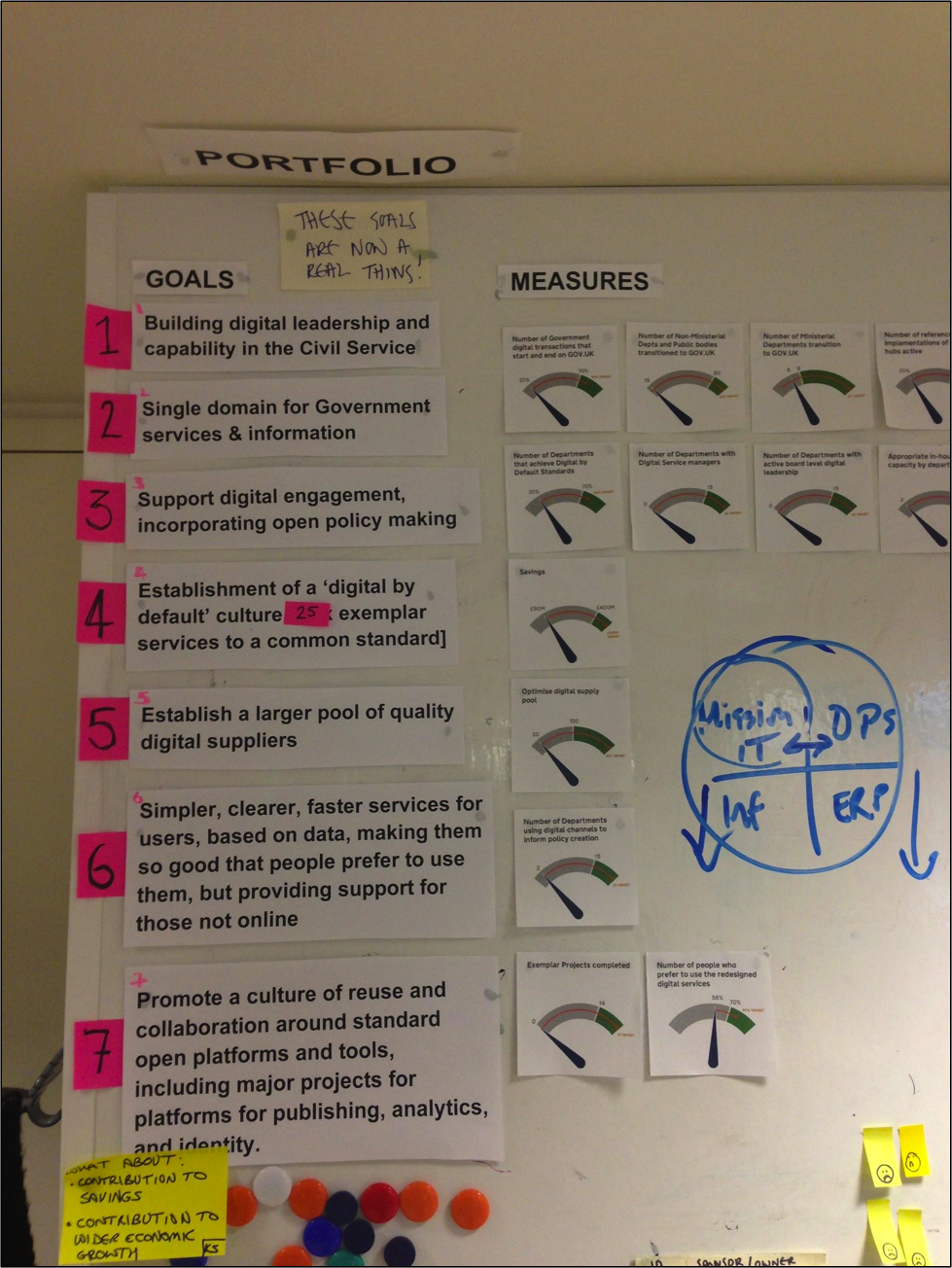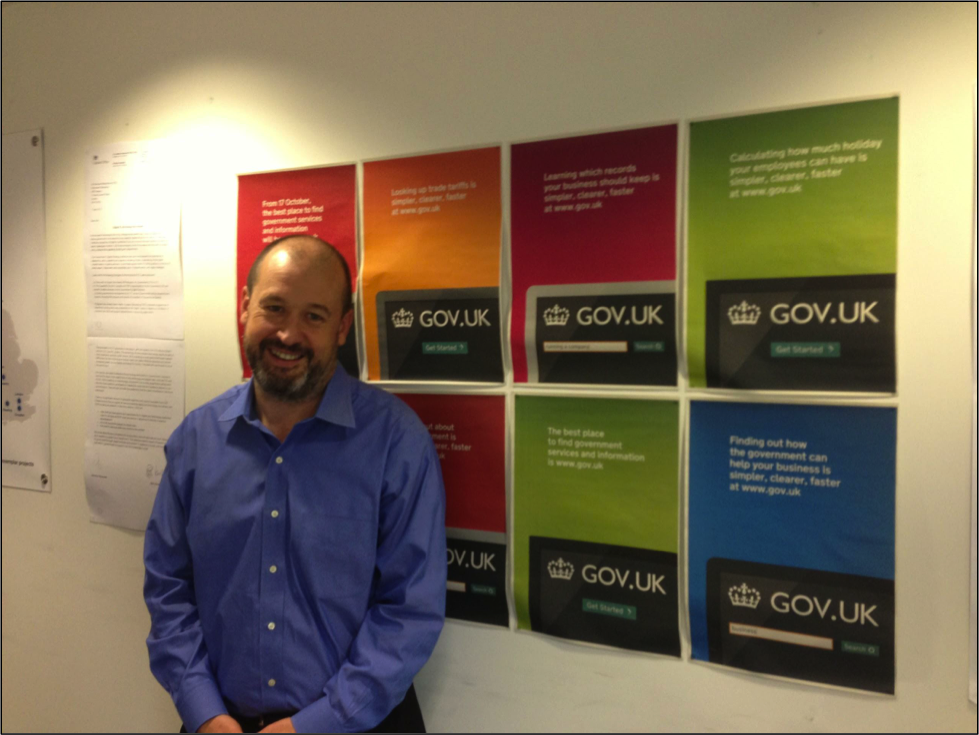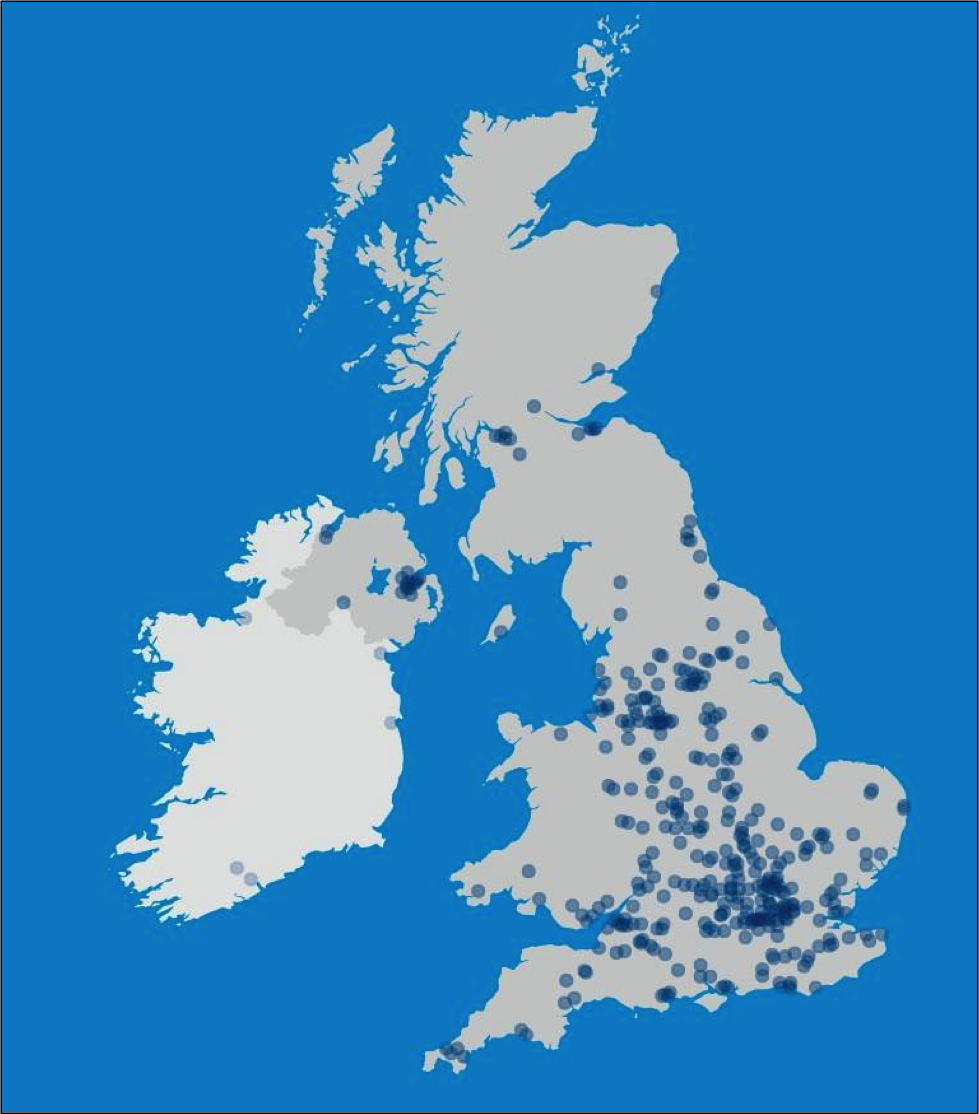How to Outfox a Broken Procurement System and Other Digital Government Lessons from the U.K.

Flickr user paul_clarke
Agencies could learn a great deal from Mike Bracken, director of the United Kingdom’s Government Digital Service.
Two years ago, the United Kingdom launched GOV.UK in beta , redefining what a government platform could be online .
This month, the Cabinet Office demonstrated five new core digital services for the first time. The services are worth noting, as are the means of their production. In this young century, it is increasingly clear that platforms will be at the core of the digital economy and government itself. GOV.UK , which has gone through hundreds of iterations since it officially launched, represents a "digital by default" approach to governance and an award-winning set of design principles that deserve to be studied and adopted around the world.

[Image: White board at the Government Digital Services offices in London]
In a time when digital government supports open government , the choices that the United Kingdom is making around open source and open data are worth studying, just as its positions on press freedom, mass surveillance and transparency require scrutiny.
To learn more about the new services, I interviewed Mike Bracken, the Executive Director of Digital at the U.K. Cabinet Office, about what’s coming from the Government Digital Services (GDS) team and Her Majesty’s Government, what the changes will mean for tens of millions of Britons, and his thoughts on legislative proposals to create a Digital Government Office and IT reforms in the United States.

Speaking to NPR late last year, Bracken urged the United States government to adopt a digital core , reforming how it builds, buys and maintains services. As the White House considers and, eventually, implements reforms to avoid another Healthcare.gov debacle , the United Kingdom's experience will remain relevant.
Our interview, lightly edited for length and clarity, follows.
Can people see the new services online now?
These services will go live over the next two months. Today was the day not to ‘live’ them but to view them. You can see previews at https://www.gov.uk/transformation . (Numbers 1, 9, 15, 21 and 24.)
The uninteresting thing is that they’re simple Web interfaces. The beauty of them is simplicity.
How were these new digital services built?
The GDS helped build them with teams in those parts of government. One interesting aspect of these five services, and the respective cabinet offices involved like the Home Office, Ministry of Justice, and DVLA , is that we’ve essentially spun up mini-GDS functions inside of those organizations, which now run and operate them. Those little bits are now helping run the mainstream aspects of those services. We have not done a massive re-engineering job. Rather, we’ve just put an agile engineering process at heart of those paper-based organizations.
How are you moving beyond paper?
Let’s start with exemplar Number 9, with motoring. In the United Kingdom, there is a point system for motoring fines. If I’m caught speeding, I may get 3 points. I might get 6 for something else more serious. At 12 points, a driver may lose his or her license. At any given time, a motorist therefore has a number of points on the license.
When a car or vehicle has to be insured — and that’s every year – at the point of insurance, the motorist has to say how many points they have. There are two problems that arise. At the time, they may say 3, but a week later, that may have changed. The second is more important: the insurance agency has no way of easily checking the statement. They take their word for it, take account of their age, demographic and location, and then give a quote. Because it is not accurate, they put a rider on top of it.
We’ve now provided an API [application programming interface] to the insurance industry. Now, an insurance agency will issue an accurate quotation based upon the real number of current points. Representatives from the insurance industry estimate that this will result in a net reduction of costs every month, perhaps of fifteen pounds. By cleaning this data and making it more open, the entire industry will improve its efficiency.
What about prison visits?
This next one has more of a social outcome. This week, Jeremy Wright, the parliamentary under secretary of state for Justice, showed a simple service which allows individuals and families to book a prison visit. This was not just a paper-based system but one based upon access and control to prisoners. It is highly inefficient and very limited to the visitor. The system leads to lots of waste and visits being missed, and therefore social consequences to families and individuals already having a bad time of it.
By creating a simple service, we think that it will have a huge social consequence to those in prisons and their families and help with rehabilitation services. Today is a “see what happens day” for this -- we’re not standing here saying everything is fixed. It’s a step forward.
What about other services?
Greg Clark, the minister of state for cities and constitution, demonstrated ERTP [Electoral Registration Transformation Programme] , an online register to vote. It’s not voting, but getting on the electoral register.
This registry is a Victorian hangover. It asks at the start “who is the head of the household?” Like many public services, it assumes a man is the head. It is deeply out of kilter with the time we live in. The new service breaks it down to individuals, allowing for a much more diverse set of lifestyles and living arrangements. It reduces the number of visits to people’s home, and removes that first question; it simply asks who is there.
At the heart of a democratic process is the voting system. That voting system must represent the country and living conditions it’s located within. By next year, we aim to have 40 million people able to use it.
Is the code for the registry open source? Could the U.S. adopt it to implement online registration ?
Not quite. We have a bias to be open, as our general stance. The slightly country-specific issue is that the system we’ve inherited is a highly local system of electoral rolls, held in a proprietary format. Some of the connective technologies and bespoke services will remain that way and private. Someday, we would love it to be open source and accessible. Please don’t doubt that that’s our endpoint.
We now have a system of registration that will allow for local, national and regional elections. There will be a limited launch in May or June this year, and then the next big step is the general election in May 2015.
What about changes to tax services?
Today, David Gauke, the minister for HMRC (our IRS) demonstrated the changes we are showing to allow taxable elements to change month by month. In the U.K., those who pay income tax as they earn it must identify elements of reward that are taxable, like company cars.
We are now testing identity services to allow people to change elements of that throughout the year. First, we’re testing company cars. Rather than go in at the end of the year, we’re allowing people to go online and change tax status for this element. David showed the private beta of that today. You’ll see that, along with the identity service, go up in the next couple months.
So the U.K. is supporting a federated approach to identity , like the U.S.?
An individual can select an identity provider, like Experian or the Post Office. In time, it might be a bank, mobile provider or even a local social organization that they trust. It’s critical to note there’s no direct relationship between organization and government service. There’s no transfer of credentials, but only a transfer of validation. That’s a profound shift for government: In the process of identification between a user and the state, there’s an intermediary.
We’re saying as a government that a trusted intermediary’s ability to validate the identity of the individual is better than the state. There’s no political will for an identity card. That makes us hugely anomalous compared to the rest of Europe.
What about the fifth service?
We receive 3.4 million applications for in-country and short-term tourist visas to the U.K. annually. Today, Mike Parsons, chief operating officer at the Home Office, demonstrated that service.
More importantly, he demonstrated how the interface for the internal staff looks like to validate and change the service. He showed online service -- that’s fantastic -- but he also showed that if something changes, like the cost of a visa, that that can be made on the fly by the appropriate internal officials. That’s a huge change. It enables policy changes to be made overnight to the service.
What has been the reaction to the government technologists building services like this, working with new partners?
There are small number of companies for whom this is their bailiwick that are less than thrilled. The larger number of smaller companies that will have more access to the the supply chain are happy.

In the slide I’ve shared, there are several dots in and around London before, versus hundreds of dots now scattered all over the country.

What are the core lessons of what you’ve done, for others governments who wish to follow?
Open the doors up, really quickly. Make sure the tech talent that comes in is of the highest caliber, because they then invite their friends in. Set the bar very high.
Deliver quickly. Start with a few projects with high volume and a quick time to deliver. In our case, it was e-petitions .
Then, pivot and take on the gnarliest parts of government. We went after tax, after voting, after benefits.
Make sure the process is open. Make sure there’s a connection to the end users.
Next, route around procurement. In the short term, put it all in the cloud.
Do everything under one hundred thousand pounds. Do everything so that the procurement machine can’t stop you, because it will gear up.
We have to adhere to EU public procurement directives, but this Government has lobbied hard to make those directives work for us, and there is flexibility at the lower end of the scale. We’ve slashed the time and resource required to bid for Government work, made the process cloud-based and now we’re working with small companies that would never have got near Government work before.
What do you think of the proposal for a United States Digital Government Office ?
I’ve seen the bill. It’s great. In your system, however, it must have cross-party support.
The thing that worries me, and I praise the people who put it together, is that it’s still another form of procurement. The problem with procurement reform is that it’s often procurement itself which needs to be abolished. At GDS, we simply commission if possible. Our switching costs become marginal. We follow the market, from identity to skills needed. My colleague Bill Crothers has set up the Crown Commercial Service to address this and other issues, and he is setting up new commissioning and commercial relationships with suppliers to route around the existing bottleneck. I think this is advisable to all countries in our situation
When you commission at the point of need, there is a massive change in emphasis. It seems like a tweak to the fundamental system to say “let’s procure better.” What we say is don’t procure at all if you can’t change the service and iterate daily.
This change needs political leadership. It’s a farcical situation. The companies that are doing this are not the U.S. government. Why aren’t they being called out?
We have this all over the British government. You just need a small team; we’re only 300 strong, in a country of 70 million people. It doesn’t take a lot. We went to the Cabinet and the ministers banged the table in support. We have political backing, as they all seem to be so fed up with what’s happened with IT projects in the past.
At what point does your system say, alright, enough with this? I don’t know when that tipping point is, but why not now?
It’s not just you, not just us, but countries around the world. Something has to be changed: these problems are systemic with technology and government. We’re just not getting great services. That’s true in Singapore and Mexico and France and Germany and Australia. Now there are individuals in all of those places trying to solve the problems in their own way. They can only be successful if they have political backing or if there’s a vacuum.
How does the GDS strategy compare to traditional approaches?
We use and work with hundreds of companies to do what we do. When we say we built it, yes, we have a small internal team, but what we do is create standards and services that enable them to work with us.
We have been explicit at trying to break down barriers for companies to work with us. That frequently results in SMEs [small to medium-sized enterprises], as opposed to entrenched interests who want to work in a big engagement.
That’s been resulting in a larger number of smaller firms, where they can work with suppliers to get what we need, as opposed to working with an enterprise whom you give a policy ambition, then ask to get to the place, then get solution back years later.
How has that approach affected your costs?
It’s vastly cheaper.
Alexander B. Howard is a writer based in Washington, DC. He is currently a fellow at the Tow Center for Digital Journalism at Columbia University, columnist at TechRepublic and contributor to various fine publications, including TechPresident, ReadWrite, Mashable, Politico Magazine, The Daily Beast, Forbes, and Buzzfeed.
( Top image via Flickr user paul_clarke )






 By
By